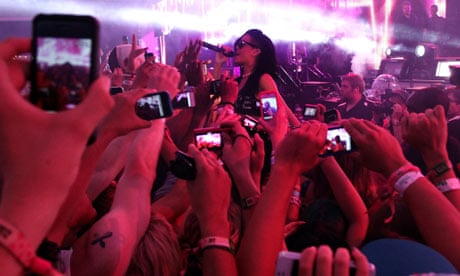Back in the mid-90s, an act from the record label I ran at the time was selected to appear on Top of the Pops. But when we went to meet the American duo at Heathrow, neither of them got off the plane: they had decided to stay at home. Eventually, we hired two actors to play the role of DJ and keyboard player. They looked the part and no one seemed to notice. I was reminded of this episode yesterday when reading that DJ Calvin Harris has threatened legal action against the BBC for quoting him in a Radio 1 Newsbeat programme in which he appears to endorse prerecorded DJ sets.
Like wrestling in the 1970s, there's always been an element of knowing subterfuge in dance music. Since much of the alchemy of the 12-inch mix is often down to one person and a bunch of machines, it does not always translate well to live performance. The real magic is when a skilled DJ and a box of records – or laptop or memory stick, as it increasingly is today – take those solitary studio moments and turn them into something communal and occasionally transcendental, with the assistance of a packed dancefloor.
But where there's brass there's muck and the latest mania for EDM (an acronym for electronic dance music) in the US has brought with it a whole new set of rules. EDM has effectively bypassed the club culture on which house and techno were founded and gone straight for the stadiums and festival jugular. Judging by the many clips on YouTube, its stars have taken their cues from rock stars rather than the clubbers who helped to create dance culture around the skill of DJs such as Frankie Knuckles. This new breed of star DJ is not content to be hidden away in a booth with a tiny slit, like Junior Vasquez was at New York's seminal Sound Factory. Instead they mosh and crowd surf (DJ Steve Aoki was hospitalised after an incident involving a trampoline last week: he's clearly no Nils Lofgren) from their elevated stage, while the crowd look on, shuffling and whooping. Worse still, some of them are alleged to perform to the kind of pre-mixed sets that have caused the Calvin Harris controversy.
Prerecording sets is a curious phenomenon, because it's the live interaction between DJ and dancefloor where the real fun occurs. Without the ability to change the mood, change the tempo, change the style, you're nothing more than a jukebox that needs a toilet break every so often. It's what makes DJing more elastic and versatile than, say, a rock band, whose members are tied to their audience by the songs they know and have rehearsed. Good DJs have the world of recorded music at their disposal. Half the pleasure of playing is to seamlessly go from an Underground Resistance tune into a Queen B-side before anyone realises what's happening. Prerecording misses the point entirely. Like the trend towards ghostwritten tracks (as documented in the latest issue of Mixmag), it's all part of the same culture that has grown up around, but not truly connected to, the roots of club culture.
Two seasons ago, I spent a night checking out all the big clubs in Ibiza and was struck by how surprisingly dull a lot of it is these days. Tiesto's performance at Privilege looked like 10,000 people waiting for the world's largest bus to arrive. Those supernatural nights where the DJ appears to be communicating personally with each member of the dancefloor were nowhere to be seen. What marks out these events is how little interaction there is between DJ and audience. The audience consumes rather than participates, foregoing any form of empathetic experience in favour of bland ingestion (and usually faithfully documented by the cancerous presence of a thousand camera phones held aloft). A great DJ can coax you into places you didn't know you wanted to go until you get there. It's what marks them out from a ninny with too many tattoos playing a CD.







